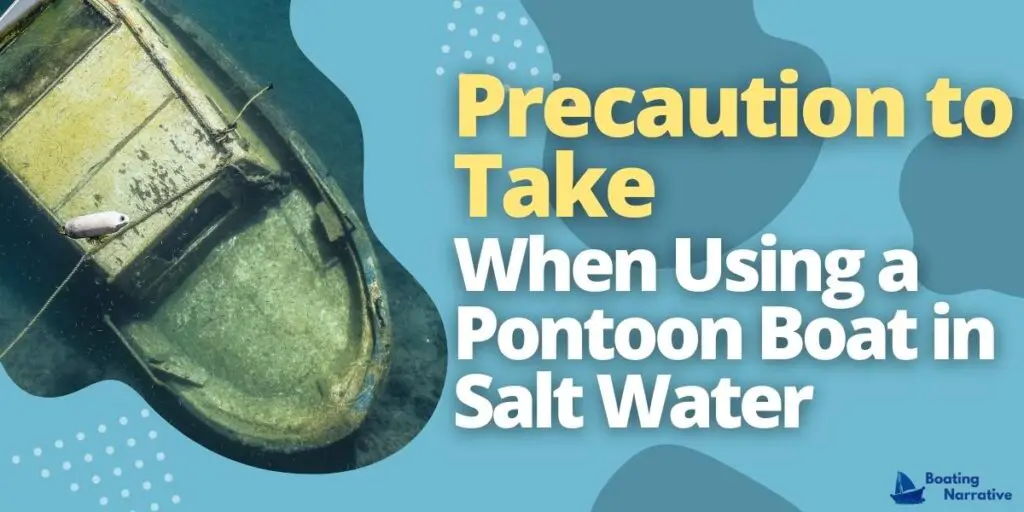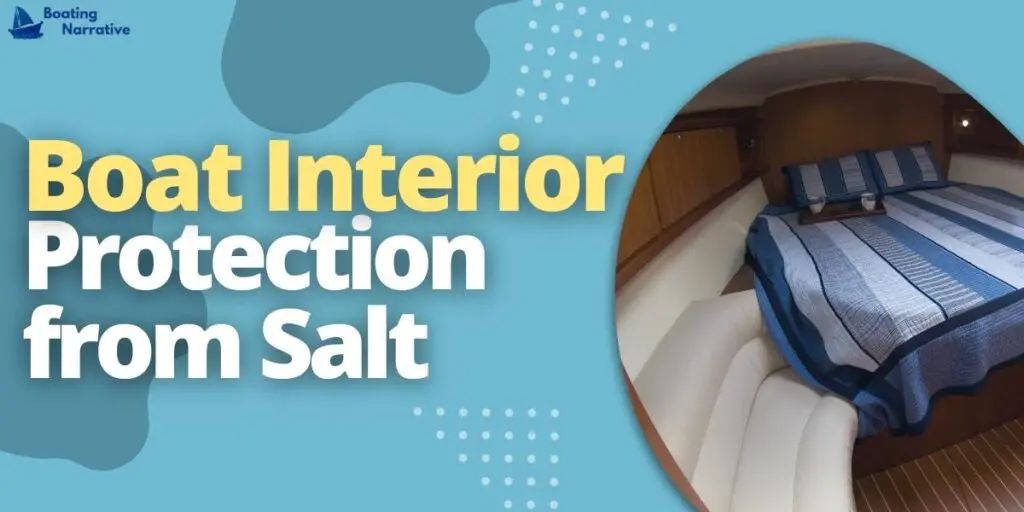What do you do if you have a pontoon boat, but you’re worried about what will happen to it when it gets to saltwater? You can’t keep it in the garage all the time, but you don’t want to have to throw it away and buy a new one.
Pontoon boats are one of the most popular boats for recreational use. They’re used for fishing and fun, and they come in various sizes and styles.
In this blog post, I’ll give you some tips to help you keep your pontoon boat safe when it’s in saltwater.

Here’s The Answer To Can Pontoon Boats Be Used in Saltwater
Pontoon boats are designed to handle fresh water, so they should be fine to handle saltwater. However, their hulls are not designed to handle saltwater as well as most other boats.
They can last for years in salt water, but they will corrode faster than their freshwater counterparts.
Tips on Using a Pontoon Boat in Salt Water
Use these pontoon boat saltwater tips to make the most of your vessel:
- Inspect the pontoon boat before every use. Ensure there aren’t any dings or scratches on anything and that everything works properly.
- Dock the pontoon boat as soon as it arrives at the saltwater location. Don’t let it drift away while you’re out fishing! Hold onto a line, or tie it to something nearby.
- Saltwater can damage pontoon boat hulls if they’re not kept in the proper conditions. Make sure the boat is covered when it’s not in use, and rinse off any saltwater that accumulates on the boat during use.
- Pontoon boats shouldn’t be left in saltwater for an extended period. Swim in and out of the boat regularly to keep it fresh, and water the boat before leaving saltwater for an extended period.
- You should also have the boat serviced more frequently to check for corrosion and damage.
- It is also important to use marine-grade paint and parts on a pontoon boat used in saltwater.
- If you are unsure if your pontoon boat can handle saltwater use, consult with a professional before taking it out.
Misconceptions About Pontoon Boats in Salt Water

There are many misconceptions about pontoon boats and saltwater. For example, some people believe that pontoon boats cannot be used in saltwater, but this is not the case. Aluminum pontoon boats can withstand saltwater, making them ideal for saltwater fishing.
There are some things to keep in mind when using a pontoon boat in saltwater. The most critical step is to thoroughly clean the boat after each use.
This means that all of the salt and debris must be removed from the boat. Keeping an eye on the boat for signs of corrosion is also essential.
Pontoon boats are a great option for those who want to use them in saltwater. They can last for many years if properly cared for and kept in good condition.
Precaution to Take when Using a Pontoon Boat in Salt Water

The most important precaution to take when using a pontoon boat in saltwater is to ensure that the boat is properly anti-fouled. This means that the bottom of the boat is coated with a special paint that prevents marine life from attaching to it.
Salinity can also cause corrosion, so it’s important to make sure the boat is made of corrosion-resistant materials before setting out on the water. The tubes that make up the pontoon boat are usually made of aluminum, which is not as strong as some other metals.
However, aluminum pontoon tubes can withstand saltwater corrosion when properly coated with anti-fouling paint and given other precautions.
The wiring on a pontoon boat should also be taken care of. Saltwater can cause corrosion of the wiring, so it is important to make sure that the wiring is made of stainless steel or other corrosion-resistant material.
The brackets that hold the pontoon tubes together can also be stainless steel to prevent saltwater corrosion. Another important consideration for pontoon boat owners is the type of flooring.
Saltwater can cause vinyl flooring to deteriorate, so it is important to choose a flooring resistant to saltwater damage. Powder coat paint can also be used.
How Does Saltwater Water Impact Boat Performance?
Saltwater can have a corrosive effect on boats, causing them to break down and deteriorate more quickly. In addition, saltwater is denser than freshwater, making it harder to move the boat through the water and can also cause the engine to overheat.
Saltwater also has a higher evaporation rate, which can cause the boat to take on more water and become less stable. Most boat manufacturers offer warranties that do not cover use in saltwater.
How Do Saltwater Boats Perform?
Saltwater pontoon boats are designed and built to withstand the harsh conditions of saltwater. They are made with corrosion-resistant materials and have special coatings to protect against the sun and salt.
Saltwater pontoon boats perform well in both calm and rough waters. They are stable and provide a smooth ride. They are also easy to maneuver and can be towed behind a car or truck.
In comparison to freshwater, saltwater is far more corrosive, so pontoon boats that are used in saltwater must be made with stronger metals and tighter seals. In addition, many manufacturers have clauses that void the warranty if the pontoon boat is used in saltwater.
How Do You Protect Pontoon Boats from Saltwater?
The engine of a pontoon boat should be flushed with fresh water after each use, and the engine’s lubrication should be done regularly.
The bottom of the pontoon boat should be painted with a special bottom paint that is designed to resist corrosion. While pontoon boats can be used in saltwater, proper maintenance and following the manufacturer’s instructions are required to avoid voiding the boat’s warranty.
Some pontoon boat accessories, such as the engine, may need to be replaced more often if the pontoon boat is used in saltwater.
Paint the Hull

Yes, you can paint the hull of a pontoon boat that will be used in saltwater. However, you should use marine-grade paint specifically designed for use on boats.
It is important to properly prepare the surface of the hull before painting. This includes sanding and priming the hull. You should also use paint that is designed for use in saltwater.
Talk to a professional boat painter or marine surveyor to get the best advice on what kind of paint to use on your pontoon boat.
Sacrificial Zinc Anodes
Zinc is more electrically active than other metals, so it will corrode before they do. This is known as galvanic corrosion. As the zinc corrodes, it creates a barrier that protects the other metals from corrosion.
You can purchase sacrificial zinc anodes at most marine supply stores. However, selecting the right one for your pontoon boat can be a challenge because they come in various shapes and sizes.
Most anodes are made of aluminum, but you can also find ones made of copper. Once you have your anodes, you will need to install them on your pontoon boat.
This can be done by attaching them to the hull with stainless steel brackets or welding them directly. But, again, a professional can do this for you if you don’t feel comfortable doing it yourself.
Boat Interior Protection from Salt

Pontoon boats are often used in saltwater bodies such as the ocean. While they are not as susceptible to the effects of saltwater as other types of boats, they can still be damaged by salt deposits.
It is important to take measures to protect the interior of your pontoon boat from saltwater. One way to protect your pontoon boat from saltwater is to cover the floor with a tarp or other waterproof material.
This will prevent salt water from seeping into the floor and causing damage. You should also cover any exposed metal surfaces with a layer of wax or grease. This will prevent salt from corroding the metal.
How Long Can You Leave a Pontoon Boat in Saltwater?
It is not recommended to leave your pontoon boat in saltwater for extended periods. Saltwater is very corrosive and can cause damage to the boat.
The aluminum tubes that make up the pontoon boat can start to corrode, and the lubricant used to protect the boat can start to break down.
If you plan to use your pontoon boat in saltwater, it is important to flush the boat out with fresh water after each use.
Saltwater Maintenance
While pontoon boats can be used in salt water, a few extra tasks need to be completed to keep the boat in good working order.
- Flush the engine after each use in saltwater. This will remove any saltwater that has gotten into the engine and prevent corrosion.
- Hose down the entire boat after each use in saltwater. This will remove any saltwater that has gotten onto the boat and prevent corrosion.
- Properly store the boat when not in use. This means keeping the boat out of the water when not in use and making sure that it is properly covered.
- Check for electrolysis. This is when saltwater causes corrosion of the metals on the boat. This can be prevented by using a sacrificial anode.
If you do decide to use your pontoon boat in saltwater, just be sure to take the proper precautions to prevent corrosion.
Final Thoughts
As you can see, pontoon boats are versatile and can be used in many freshwater environments. However, they are not designed to handle saltwater.
If your pontoon boat has been used in salt water, it is important to properly care for it and prevent it from being damaged by saltwater. Hopefully, by reading this blog post, you will be able to make informed decisions about using your pontoon boat in saltwater.

